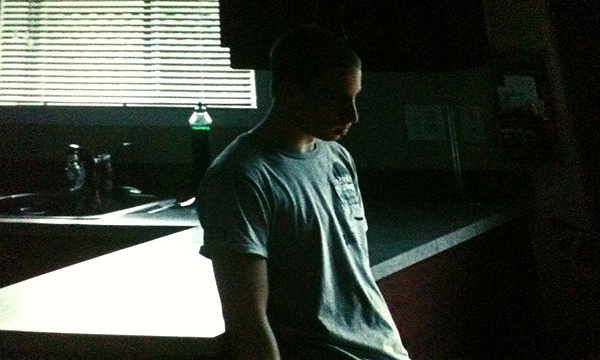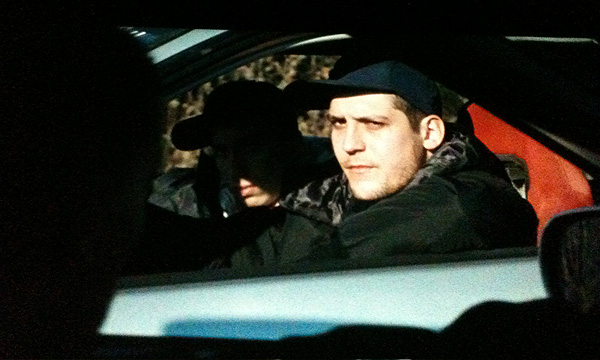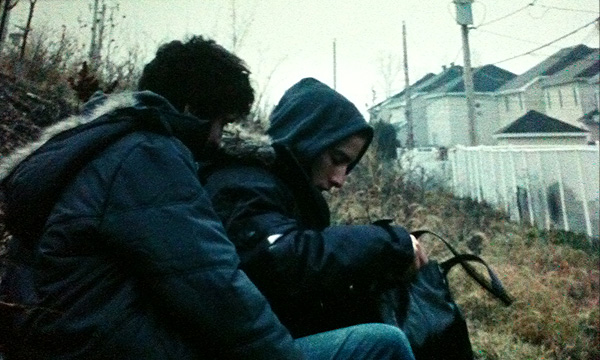Jo pour Jonathan is one of the films in competition in the New Visions category. Jonathan is a teenager living in the suburbs. His role model is his older brother Thomas, formerly a car racer in the illegal circuits popular among youngsters. Thomas gave up his racing, found a job and a girlfriend. He doesn’t feel his brother should follow his steps, he feels Jonathan should get a life of his own. But Jonathan is also into illegal racing and because of that he finds himself in trouble. To find a solution to the mess his little brother conjured, Thomas accepts to run another race, but he has an accident and is badly disfigured. Without any hint of overacting and leaving out some of the most gruesome details – the car accident, the disfigured features of Thomas in the hospital – the film deals mainly with the torpid sense of passivity of juvenile delinquents in the Canadian suburbs.



I had mixed feelings when I left the cinema after watching Giroux’s film. Jo pour Jonathan isn’t the kind of film one can easily admit to “like”. The bleak overview of the Quebecois suburbs feels a bit like the French banlieue. You have to be in love with that kind of misery and with that decay, with the hopeless sense of waste and with the alienation, like Pasolini with his beloved Roman borgate, to not simply succumb to the abhorrence of it all. Giroux’s film doesn’t offer rays of expectation or even the slightest fragment of hope. Jonathan (very well portrayed by Raphaël Lacaille) is forever trapped in a world where racing, small crime and moral numbness are the only known realities to a young person. In the best case he can hope to find a lousy job and live in a state of reassuring mediocrity. The thrill of illegal racing is actually one of the few sources of relief against the smooth paralysis enveloping existences like Jonathan’s. Nothing makes sense, nothing can offer a way out to this constant state of stupefaction. Cars, alcohol and drugs represent the ultimate connection with life in its fullest manifestations. A very desolate way to intend life. No wonder then the most lyrical moments of beauty in such a world purged of all significance come from the contemplation of skeletons of wrecked vehicles abandoned in a junkyard or from the dancing reflections of water in a plastic bottle.
Giroux demonstrates an extraordinary sense of the Ugly. Evidenced by a washed-out and extremely grainy look, in Jo pour Jonathan the Ugly becomes dominant and for this only reason beautiful in a way. Ugliness is beautiful because it’s the only possible reality. Giroux’s characters actually live in the best possible world accessible to them; they are not given, inside or outside the limitations of the film, any other chance. They don’t have the benefit of “ifs” or “maybes”; their present is barren and immutable and it’s the only prospect at all. Giroux shows no mercy for his characters, he makes no apologies to speak in their favor. He’s not cruel to them either in order to make any moral statement. Life drags on, on the same streets and parking lots, behind the same walls and spent in the same sterile activities. Tragedy occasionally strikes, but we do not expect redemption to re-establish a sensible order in the story and to bring a solution to the characters’ troubles. We don’t expect punishment either. Expectation is beyond the point of the film.
Title: Jo pour Jonathan
Year: 2010
Director: Maxime Giroux
Genre: Drama
Country: Canada
Runtime: 81 minutes
Language: French